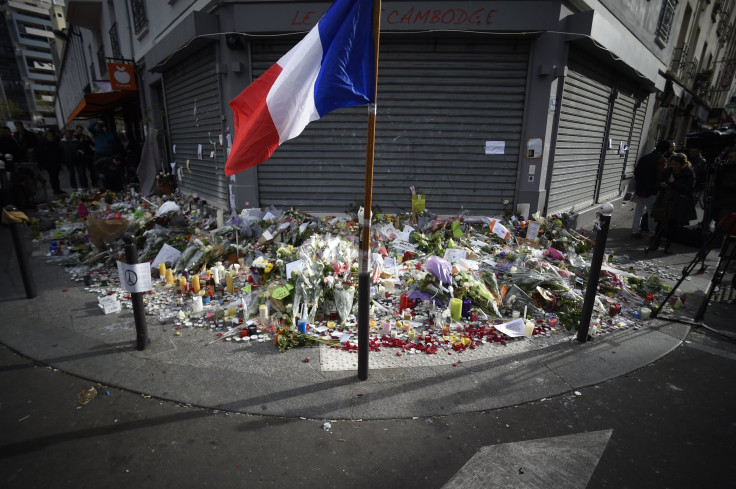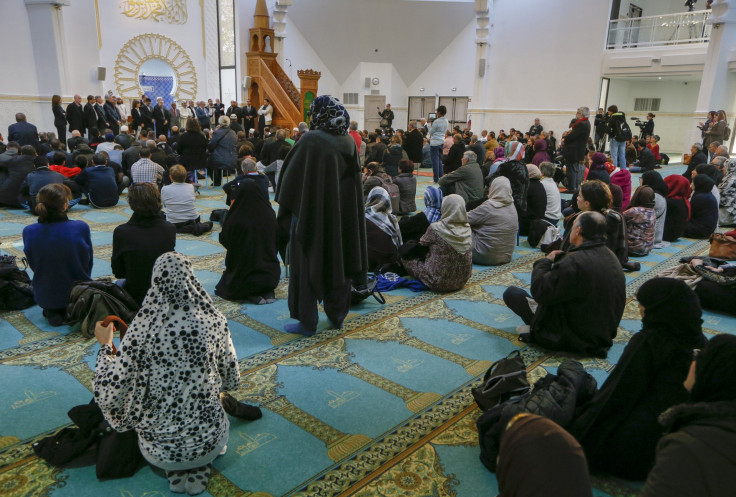Young Parisians Call For Unity And Understanding After Paris Terrorist Attacks

PARIS— Amandine Barras, 29, rolls a cigarette outside a bar in Paris’ lively 18th arrondissement, sharing a joke with two male friends. This neighborhood is one of the most racially and socioeconomically mixed areas in Paris, home to the city’s artists and working classes. Writers and musicians share living space with philosophers and cleaners. But four days ago, these streets were the site of the deadliest attacks in Paris since World War II, when seven armed men launched six simultaneous attacks across the city, leaving at least 129 people dead and hundreds more injured.
The victims were “people like us; they think like us, live like us and talk like us. We feel really targeted,” Barras said, telling International Business Times that it was only the second time she’d left her apartment since Friday.
“They hit in places where we go out, where we sit outside in open places,” she said.
A weariness has seeped into the cracks of Paris’ most diverse neighborhoods, born from the realization that anyone can be targeted by terrorists claiming to carry out attacks in the name of Islam— including Muslims. But as the shock subsides, the attacks are kick-starting a deeper discussion about what it means to be French in a multicultural, multiethnic nation. In the wake of the horror, Paris’ young urbanites are being forced to reexamine the faultlines in French society.
"Don't become an ‘amalgames’ (which loosely translates to a person who intentionally perpetuates discrimination), don't promote hate. It’s not because you’re a Muslim that you’re a terrorist.” Barras told IBT from the bar. "We need to be vigilant. But the gap between paranoia and vigilance is not that big, so we need to be careful.”
This sentiment echoes a newfound solidarity that was not present after the January attacks on French satirical newspaper Charlie Hebdo and kosher supermarket Hyper Cacher. Victims of Friday’s attack did not belong to a single tribe, profession or religion. People were targeted for being French, for enjoying their lives in a restaurant, at a concert or in a bar.

The Charlie Hebdo attack was more divisive -- the magazine had published drawings of the Prophet Mohammed, which is forbidden in Islam. While the majority of France’s Muslims did not condone the attacks, they did not agree with the cartoonists’ portrayal of the Prophet. But many in France saw the attack in black and white terms: Either you were with Charlie or you were against France and French values. Expressing any criticism of the cartoons left people in the Muslim community guilty by association.
In contrast, Friday’s massacre is viewed by many young Parisians as an attack on Paris’ diversity; young people believe that reinforcing community divides will only make them more vulnerable to further assaults, they have said. Terror groups have long thrived in areas where deep divisions bifurcate cities and nations. Now young, liberal Parisians are starting to subscribe to the belief that communities are stronger when united.
"If everyone had a common point in their identity then we wouldn’t have these problems. This is a conflict of communities,” Stephane Roro, 29, an employee at France’s Ministry of Agriculture, said. "You think France has social differences like every other country, but there’s a lot of discrimination. You might not have a job or a good life, it’s [mostly] because of discrimination.”
France unemployment rate stands at 11 percent-- double that of the United States -- and more than 40 percent of French youth are jobless. Roro told IBT that many of France’s issues are far too complicated for him and his friends to make sense of. But his opinion is representative of the thought process now evolving among Paris’ liberal youth. There is a growing empathy for those who, disenfranchised and disaffected by mainstream French society, are turning to extremism.

“Everyone from 14 to 25 is trying to make their life. If no one was ever nice to you or complimented you and [the Islamic State group] says ‘come with us you’re important,’ you go because you want to be useful,” Roro said. “It’s just a cry to say, ‘I exist.’"
Roro is aware that young French Muslims are likely to experience a backlash after the attacks. “Now a Muslim kid has it twice as bad as us. When you think of that it makes you sad. You don’t want to be in his shoes,” Roro said.
Barass works predominantly with immigrant communities, including many Muslims. She knows it’s irrational, she says, but she feels uncomfortable when she sees someone in Islamic religious clothing on the metro, the French subway system.
“I’m normally the first one against that, I work with these people and Muslims have amazing values,” she said. “But in the metro I admit it, I’m scared. I’m not proud of it.”
Fear is a normal reaction after the attacks, but Parisians are not willing to let that emotion control their lives.
As Roro and Barass are talking, smoking cigarettes and drinking beer, an unknown man approaches their table, smelling faintly of liquor and old clothing. They engage him in conversation and offer to roll him a cigarette. They laugh together, before the man asks to embrace these two strangers and follows up with a kiss on their foreheads. For now, the attacks have coalesced the disparate people of Paris into an overwhelmingly inclusive mass.
The man turns to the young friends. “There is a need for love in this city. Live your life. Don’t be afraid of anything, destiny is destiny,” he says, before disappearing down the street.
© Copyright IBTimes 2024. All rights reserved.












